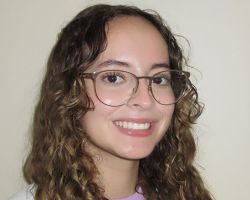Student(s): Layla Puig
Project: Evaluating CRISPR Strategies for Stem Cell Differentiation | View Poster (PDF)
Major(s): Bioengineering
Advisor(s): Tomas Gonzalez-Fernandez
Abstract
Clustered Regularly Interspaced Short Palindromic Repeats (CRISPR) is a gene-editing tool used for precise genetic modification and regulation. Through the knock-out, knock-in, activation, or repression of specific therapeutic genes, CRISPR holds great potential to overcome the phenotypic instability resulting from traditional differentiation methods. To assess the efficacy of different CRISPR strategies for regenerative medicine applications, a robust system and controls are required. The objective of this work is to establish a system to evaluate the differentiation of bone marrow mesenchymal stem cells into chondrocytes (chondrogenesis). Following lineage-specific cell culturing, differentiation was assessed through histological staining and biochemical assays. Chondrogenic differentiation involves the production of an extracellular matrix (ECM) rich in glycosaminoglycans (GAGs) and collagen, therefore precise histological analysis is required to evaluate cartilage formation. Chondrogenic differentiation was conducted in pellet cultures, which were then embedded and sectioned for microscopic examination. The pre-established section process involved cryosectioning; however, it resulted in tissue tears and bubbles, compromising structural integrity. In this experiment, we optimized the sectioning process by embedding samples in paraffin wax and using a microtome, producing thinner, structurally intact sections that allow for detailed morphological and ECM analysis. We expect the paraffin wax embedding technique to result in clean cross-sections without background staining, and the staining intensity to exhibit a strong correlation with the biochemical analysis. This optimized methodology provides a robust system for assessing MSC differentiation, which will serve as a foundation for evaluating the efficacy of CRISPR-based gene-editing strategies in vitro and in vivo.

About Layla Puig
Layla, born and raised in Puerto Rico, is a sophomore bioengineering student specializing in biomechanics and biomaterials. As a Clare Boothe Luce Research Scholar through the P.C. Rossin College of Engineering and Applied Science, she joined the TGF Lab, where she has conducted research on biomaterial-guided CRISPR delivery and peptide synthesis. In August 2024, she earned second place in the Oral Presentation Category at the Lehigh University Research Exposition. In November, she presented her research at the Annual Biomedical Research Conference for Minoritized Scientists (ABRCMS). Currently, Layla works alongside PhD student Josh Graham, performing tri-potentiality assays with rat mesenchymal stem cells and optimizing tissue sample embedding techniques. Beyond the lab, Layla is the Creative Director of the SHPEtinas, an extension of the Society of Hispanic Professional Engineers chapter at Lehigh. She enjoys trips to the beach, painting, and spending time with friends and family.
